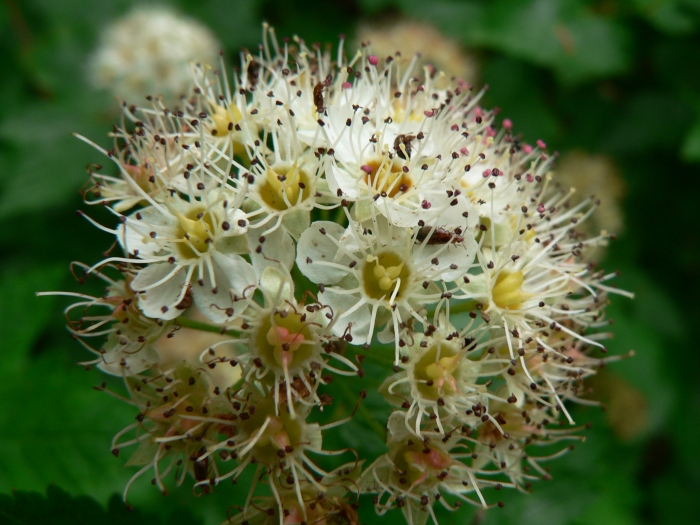Pacific Ninebark
(Physocarpus capitatus)
Pacific Ninebark (Physocarpus capitatus)
/
/

Walter Siegmund (talk)
CC BY 2.5
Image By:
Walter Siegmund (talk)
Recorded By:
Copyright:
CC BY 2.5
Copyright Notice:
Photo by: Walter Siegmund (talk) | License Type: CC BY 2.5 | License URL: https://creativecommons.org/licenses/by/2.5 | Uploader: Wsiegmund | Publisher: Wikimedia Commons | Title: Physocarpus_capitatus_18341.JPG | Notes: Uploaded own work with UploadWizard |





































































Estimated Native Range
Summary
Physocarpus capitatus, commonly known as Pacific Ninebark, is a deciduous shrub native to moist stream banks, wetlands, and forested riparian areas in the Pacific Northwest, including the Western United States and British Columbia. It typically grows to 1–2.5 meters (3 ft 3 in – 8 ft 2 in) tall and is known for its exfoliating reddish-gray bark that peels away in many irregular thin layers, giving the plant its common name. The shrub has a rounded form with arching branches and features clusters of small, creamy white flowers with five petals and numerous red-tipped stamens that bloom in late spring to midsummer, providing a modest yet attractive display.
Pacific Ninebark is valued for its adaptability to various soil types and moisture levels, making it a versatile choice for gardeners. Its ability to thrive in both wet and somewhat dry conditions, along with its preference for partial shade to full sun, allows it to be used in a range of garden settings. It is often utilized for naturalizing in wild gardens, as a component of riparian plantings, and for erosion control due to its dense root system. While it can tolerate drought to a degree, it performs best with consistent moisture. Gardeners should be aware that although it is generally low-maintenance, it can be susceptible to powdery mildew and leaf spot diseases. Pruning can help maintain its shape and promote airflow to minimize disease risk.CC BY-SA 4.0
Pacific Ninebark is valued for its adaptability to various soil types and moisture levels, making it a versatile choice for gardeners. Its ability to thrive in both wet and somewhat dry conditions, along with its preference for partial shade to full sun, allows it to be used in a range of garden settings. It is often utilized for naturalizing in wild gardens, as a component of riparian plantings, and for erosion control due to its dense root system. While it can tolerate drought to a degree, it performs best with consistent moisture. Gardeners should be aware that although it is generally low-maintenance, it can be susceptible to powdery mildew and leaf spot diseases. Pruning can help maintain its shape and promote airflow to minimize disease risk.CC BY-SA 4.0
Plant Description
- Plant Type: Shrub
- Height: 8-12 feet
- Width: 8-12 feet
- Growth Rate: Rapid
- Flower Color: White
- Flowering Season: Spring
- Leaf Retention: Deciduous
Growth Requirements
- Sun: Full Sun, Part Shade
- Water: Medium, High
- Drainage: Fast, Medium
Common Uses
Bank Stabilization, Bee Garden, Bird Garden, Butterfly Garden, Drought Tolerant, Erosion Control, Low Maintenance, Showy Flowers, Water Garden
Natural Habitat
Moist stream banks, wetlands, and forested riparian areas
Other Names
Common Names: Tall Ninebark
Scientific Names: Physocarpus capitatus , Opulaster capitatus , Physocarpus opulifolius var. tomentellus , Spiraea capitata , Opulaster opulifolius var. capitatus , Neillia capitata , Physocarpus opulifolius var. capitatus , Spiraea opulifolia var. mollis , Neillia opulifolia var. mollis , Opulaster opulifolius var. tomentellus
GBIF Accepted Name: Physocarpus capitatus (Pursh) Kuntze